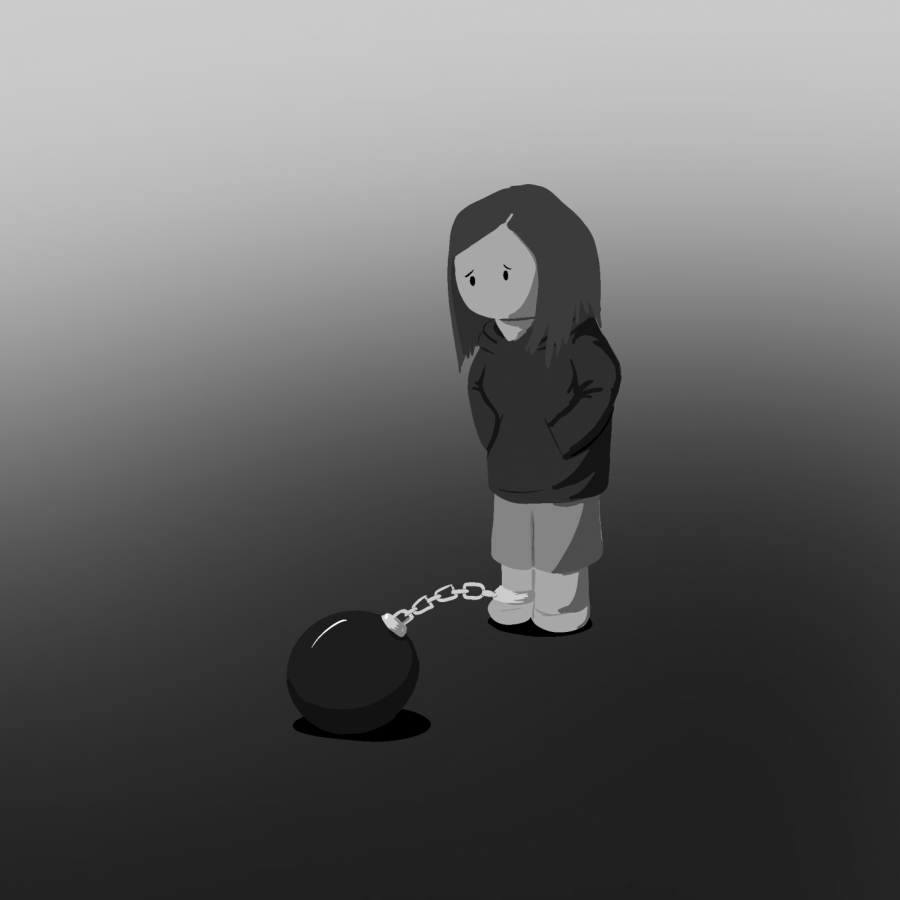Senioritis: The Pattern Before the Pandemic
This is my personal interpretation of how senioritis feels. Weighed down by a lack of excitement and motivation, the world appears drab and grey.
May 13, 2020
As students progress through twelfth grade, they often become afflicted by an ailment. This ailment is characterized by a general lack of motivation, displeasure with one’s current place in life, and apathy regarding schoolwork. These are all common traits of one condition: senioritis.
Despite its medicinal-sounding name, the term “senioritis” does not describe a medical condition; rather, it more accurately describes an observable trend. As such, senioritis has become cemented as a stereotypical part of the high school experience, so much so that teachers generally assume that their seniors will lose all motivation by the end of the year.
Senioritis is not a guaranteed part of the high school experience, in spite of its status as a widely-accepted part of high school. These lucky seniors who end the year without feeling the effects of senioritis often have something that keeps them excited for high school, from upcoming projects to the prospect of spending this last year with their friends, allowing their excitement to overpower their lack of motivation
Often, seniors may feel the effects of senioritis because they tire of the meanderings of day-to-day life. Every day for the past three years, the senior has gone through a routine without fail. They know what to expect, and by their fourth year, it has lost nearly all appeal. Thus, life after high school feels new and exciting, in comparison to the monotony of the present.
In a similar fashion, excitement over starting a new life at college can spur the effects of senioritis. Hypothetically, the anticipation over starting a new life at college can make the present feel slower, for the future seems so wondrous and bright, and the comparison between present and future events once again causes the dreaded senioritis.
Finally, and most tragically, senioritis often occurs when a senior feels as though they have nothing left to be excited for. As everything that could potentially be exciting in high school is over, a senior may see no point in remaining at high school.
Now, because of the COVID-19 pandemic, senioritis becomes more prominent than ever before. The requirements of social isolation, while ultimately beneficial to public health, exacerbate the causes of senioritis, from the monotony of life at home to the hopeful future at college to the lack of excitement present at home.
I would know this because I was once lucky enough to stave off the effects of senioritis. There was once a time where life was serendipitous, with every day an exciting new day. My extracurricular activities made high school all the merrier, for I was about to partake in everything that I was excited for, from my first musical to my last contributions to a printed newspaper. I remember that life was so bright, hopeful, amazing.
Now, I struggle to motivate myself to do nearly everything, from getting up in the morning to the hobbies that I do in the safety of my home. Senioritis hit me like a truck, for the schoolwork that I once contentedly finished now looms over my head until I finish it. I know that everything that I was excited for was cancelled, so I no longer feel excited over the near future. Simply put, in the span of a month, I have gone from living to simply existing.
Make no mistake, while senioritis is a pattern that most commonly occurs in scholastic seniors, it is evident that the recent COVID-19 stay at home orders have unfortunately aggravated this problem. While it remains crucial to social distance during these troubling times, it is also important to stay motivated and hopeful, lest the problem that stereotypically affects seniors affects others as well.






































